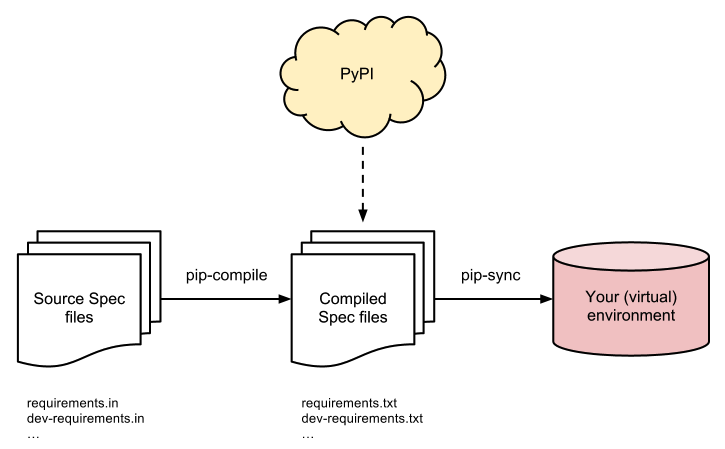A set of command line tools to help you keep your pip-based packages fresh,
even when you've pinned them. You do pin them, right?
$ pip install --upgrade pip # pip-tools needs pip==6.1 or higher (!)
$ pip install pip-toolsSuppose you have a Flask project, and want to pin it for production. Write the following line to a file:
# requirements.in
Flask
Now, run pip-compile requirements.in:
$ pip-compile requirements.in
#
# This file is autogenerated by pip-compile
# Make changes in requirements.in, then run this to update:
#
# pip-compile requirements.in
#
flask==0.10.1
itsdangerous==0.24 # via flask
jinja2==2.7.3 # via flask
markupsafe==0.23 # via jinja2
werkzeug==0.10.4 # via flaskAnd it will produce your requirements.txt, with all the Flask dependencies
(and all underlying dependencies) pinned. Put this file under version control
as well. To update your packages to the latest versions available on PyPI
, run pip-compile --upgrade.
Now that you have a requirements.txt, you can use pip-sync to update your
virtual env to reflect exactly what's in there. Note: this will
install/upgrade/uninstall everything necessary to match the requirements.txt
contents.
$ pip-sync
Uninstalling flake8-2.4.1:
Successfully uninstalled flake8-2.4.1
Collecting click==4.1
Downloading click-4.1-py2.py3-none-any.whl (62kB)
100% |████████████████████████████████| 65kB 1.8MB/s
Found existing installation: click 4.0
Uninstalling click-4.0:
Successfully uninstalled click-4.0
Successfully installed click-4.1To sync multiple *.txt dependency lists, just pass them in via command line arguments e.g.:
$ pip-sync dev-requirements.txt requirements.txtPassing in empty arguments would cause it to default to requirements.txt.

